“Now I’m caught up in the ceaselessly toxic, dysfunctional web of Led Zeppelin interpersonal relationships”: How Phil Collins’ globe-spanning Live Aid journey led to one of the most disastrous reunions ever
The hectic day that Phil Collins Concorde-hopped between continents was mired by a shambolic reunion which he unwittingly became a part of
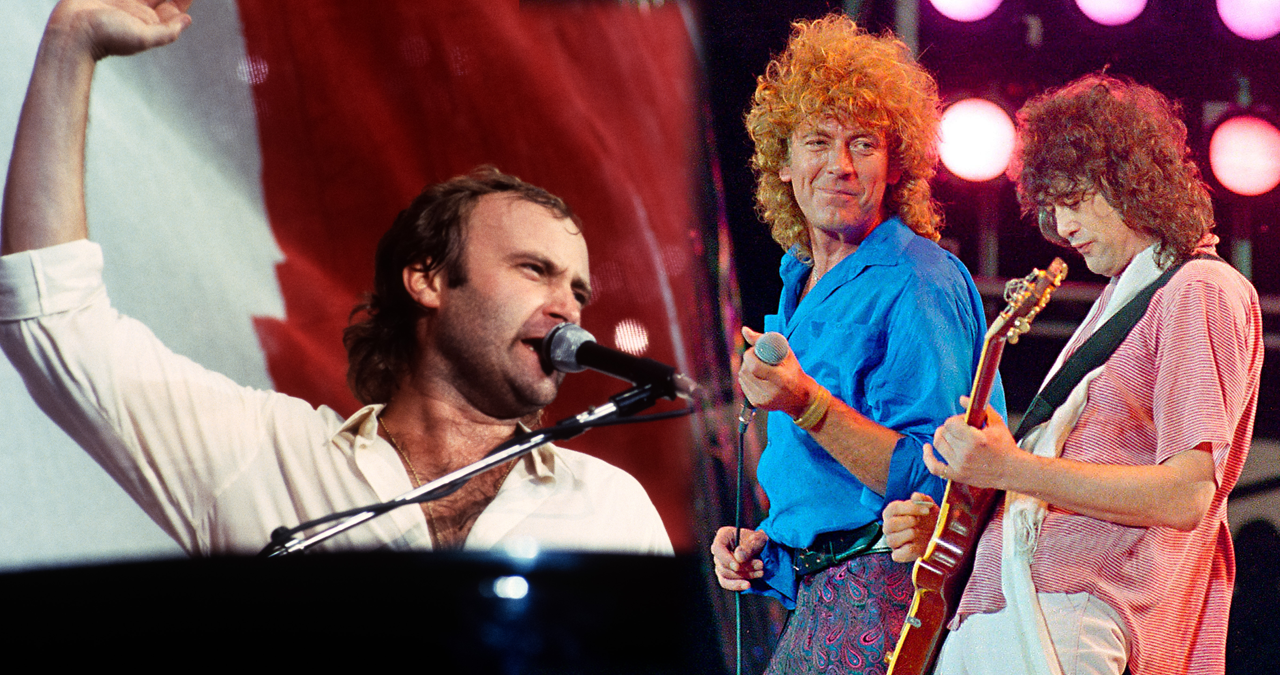
Opening their eyes on the morning of Saturday 13th July 1985, a range of music’s biggest stars began to feel more than the usual pre-show jitters. Today was, after all, the fateful day set to be enshrined in history, Live Aid.
The Bob Geldof and Midge Ure-organised benefit to raise funds to relieve the Ethiopian famine was going to be held concurrently at London’s Wembley Stadium and at Philadelphia’s John F. Kennedy Stadium - and broadcast live on television to over a billion global viewers.
Innovative, and daunting, stuff, but one musician specifically had every right to be particularly trepidatious before getting out of bed that morning.
That man was Phil Collins. At that moment, Collins was riding high on the back of his staggeringly successful third solo record, No Jacket Required, which had been released earlier in the year. Live Aid would, coincidentally, mark the culmination of the album’s world tour.
For his aficionados in 1985, this musical titan - also renowned for seizing Peter Gabriel's mantle as the frontman of Genesis - could do no wrong. But, as he got himself ready for the day, a not-so-straightforward schedule stretched out ahead of him.
First, Phil had agreed to appear at the Wembley show for a mid-afternoon set alongside Sting (a mixture of both Collins’ own material and Sting’s). Next, he had agreed to hop aboard supersonic airliner Concorde and travel some 3,500 miles at record speed to Philadelphia, where, to the eyes of global viewers, he would miraculously appear on-stage again that very same evening, albeit in an entirely different continent.
Following a solo set, Collins had agreed to take to the kit for Eric Clapton and then appear with his good friend Robert Plant and former Led Zeppelin guitarist Jimmy Page. Then maybe, he might be able to grab a drink and take five…
Little did Phil realise that this final performance was gradually evolving, behind the scenes, into a veritable Led Zeppelin reunion, featuring the return of John Paul Jones on bass and drummer Tony Thompson taking the place of the late John Bonham behind the kit, with Collins just, sort of… also there.
So, why did Phil agree to such an insane, Concorde-requiring schedule? Well ostensibly because he was firmly committed to the spirit of the day and knew that the record-setting feat would be a notable achievement.
Want all the hottest music and gear news, reviews, deals, features and more, direct to your inbox? Sign up here.
“It’s just great to be part of something like this,” Collins told reporters backstage at the Wembley show. Later, being interviewed in the Concorde’s cockpit whilst in transit, Collins said, “Basically the reason I’m doing this is because it can be done. It’s good fun isn’t it!”
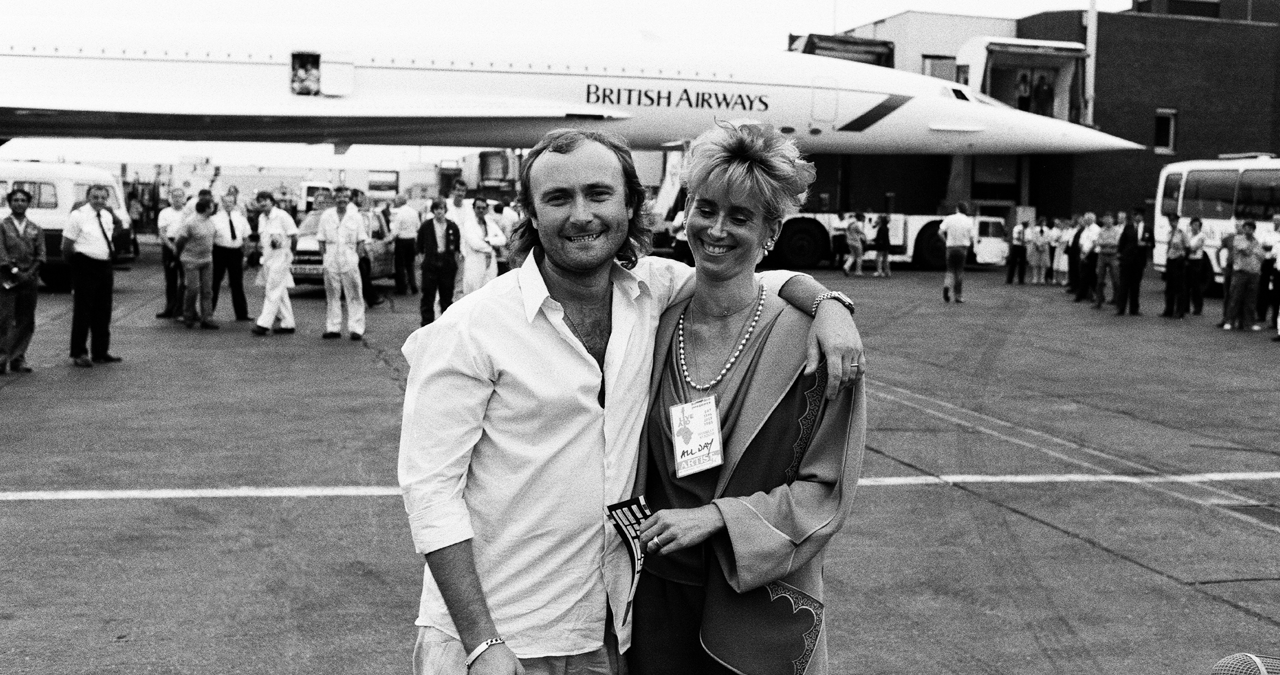
But really, Collins' journey was triggered by helping out friends in need. Namely, one Robert Plant, with whom he’d worked with on Plant’s first two solo records, Pictures at Eleven and The Principle of Moments.
“I’d played on Robert Plant’s solo records and he said: ‘Are you doing this Live Aid thing?’ And I said: ‘Yeah.’ And he said: ‘Can you get me on it? [Live Aid’s US promoter] Bill Graham doesn’t like me and he doesn’t like Zeppelin.’” Collins told Classic Rock.
“Robert said, ‘You, me and Jimmy could do something’. To me, this suggestion seems a) casual and b) reasonable. I’m busy all over the place - I’ve been performing with everybody, plugged into projects with Robert and Eric… So, even if I am already playing under my own steam I can do something else too. Why not?” Collins recalled in his autobiography, Not Dead Yet.
While Collins had initially planned to jet over and just do the Philadelphia show, a request from his British pal Sting to play together at Wembley was also difficult to refuse.
With these twin requests, the idea of Collins’ international jaunt was then thought-up. “Live Aid’s UK promoter] Harvey Goldsmith said, ‘You can get Concorde and play both.” I said: “Well, okay, if it can be done.” I didn’t think I’d be showing off,” Collins told Classic Rock.
But unbeknownst to Phil, the seemingly loose, laid back hang with Robert Plant and Jimmy Page had metamorphosed, thanks to the input of Live Aid’s chief organisers Harvey Goldsmith (UK) and Bill Graham (US), into something else entirely. “[They] got involved,” recalled Phil “‘You me and Jimmy maybe doing something together' had become the second coming of history’s greatest rock band. This is a development for which I am blissfully ignorant. Robert hasn’t called, so I don’t know that John Paul Jones is coming too. All of a sudden, it’s Led Zeppelin.”
But the immense pressure of drumming for such a notable comeback wouldn’t be felt by Phil until the end of a very long day.
Phil’s first step was his shared performance with Sting - a wooly but at times masterfully delivered set of both Phil and Sting’s material which went down a storm with the assembled masses - many of whom were particularly disposed to Phil, as they knew full well of the undertaking he’d pledged to do that day.
They were, therefore, forgiving of a (really rather minor) misplayed note during Against All Odds. A blunder that Collins' beat himself up over years later.
“lt was blisteringly hot, the white stage. lt was so hot and l made a terrible mistake on Against All Odds on the piano”, Collins said in documentary A Life Less Ordinary. “l thought, ‘Oh God, what a good start for the day this is."
Once this was completed, Collins was briskly helicoptered by British television personality Noel Edmonds to Heathrow Airport, Phil boarded Concorde and embarked on his international trek. Once touching down safely at the other end, a further chopper whisked Phil to John F. Kennedy Stadium.
Hurriedly making his way into the stadium at just gone 7pm, Collins hooked up with his old pal Eric to iron out their imminent 7:30pm set.
With Clapton, Collins had little to worry about, and the two musos locked together with a minimum of fuss, delivering another knockout performance (without a hint of jet lag, we might add)
So far, pretty impressive going.
When that was done, Phil double-timed it over to the Robert and Jimmy camp to discuss what was set to be the epic finale of Phil’s day. But Collins soon realised that this wasn't going to be quite what he had expected.
“It’s immediately obvious that Jimmy is, shall we say, edgy and jumpy,” Collins recalled in his 2016 autobiography, Not Dead Yet. Seeing a sullen John Paul Jones sitting with the group, Phil clocked that what was about to happen was going to be nothing short of the Led Zeppelin reunion, which had been long-awaited since the untimely death of the band’s drummer John Bonham in 1980, and the cessation of any live work since.
“I’m introduced to drummer Tony Thompson who was very cool with me, but not in a cool way,” Collins recollected in his book. “I mention to him the pitfalls of playing with two drummers - I’d done it for years with Genesis and with my own band, and know full well how badly it can go awry. The secret I’ve learned through hard experience is to keep it simple.”
Solid advice ahead of a globally televised, and utterly unrehearsed (as far as Phil was concerned, at least) live event. Unfortunately, it was advice Thompson stubbornly failed to heed, who instead seemingly opted to treat the performance as his audition for Led Zeppelin Mk2.
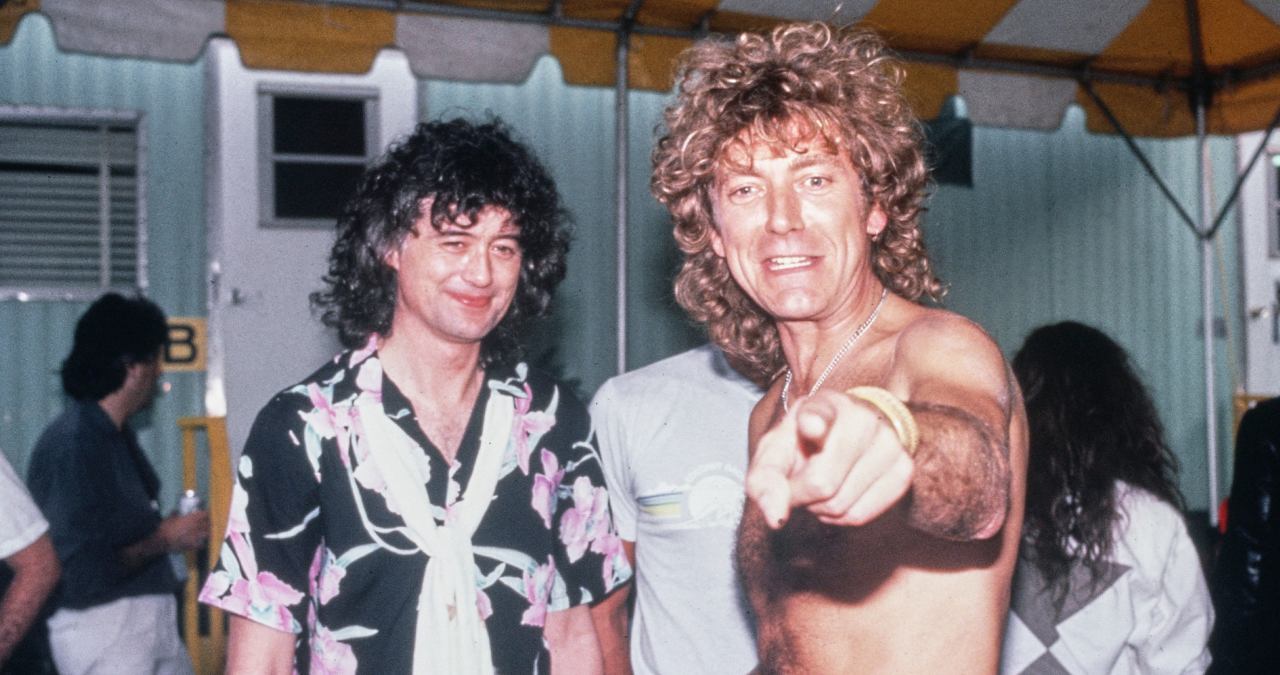
Jimmy Page too, seemed disconcerted by Phil’s involvement, and totally unaware of Robert and Phil’s earlier discussion.
Bewildered by the appearance of the chart-topping superstar, wading into what should have been a triumphant chapter of the band’s narrative, Page was hostile.
“Jimmy looked at me and said, ’So…’ in a part drawl, part growl, ‘you know what we’re playing?’”, Phil remembered in his autobiography.
Collins told Page he was well-versed (having played with Plant on his recent solo tour), but the only bit he was struggling with was the flamenco guitar part before the solo on Stairway to Heaven.
“Well, what is it then?” mocked Page.
“I think it’s this” said Collins, before demonstrating his less-than-accurate take on the section.
“No, it’s not!” smirked Page.
Phil was frustrated, he’d simply wanted to know what the part actually was - as opposed to what it wasn’t.
“I feel like I’ve failed a test,” remembered Phil in his autobiography. “What Jimmy was actually saying was, ‘Do we really need this guy?’ I’m made to feel like I’ve gatecrashed the party.”
Phil hoped his friend Robert Plant would step in and reiterate that Phil had been personally invited to play (not to mention, pivotal for even getting the band on the Live Aid bill in the first place).
But Robert was acting quite differently to the ‘lovely bloke’ that Collins had been previously familiar with. Robert had reverted back into the mercurial Robert Plant of legend - albeit with less-than powerhouse vocal chords.
“I didn’t come here to play with Led Zeppelin, I came here to play with a friend of mine who has morphed back into being the singer of Led Zeppelin - a very different animal to the one that invited me.”
Collins was anxious, as he stated in his book, “Now I’m caught up in the ceaselessly toxic, dysfunctional web of Led Zeppelin interpersonal relationships”:
As Led Zeppelin’s slot (8:10 PM - 8:30 PM) beckoned, Phil’s own role within proceedings was the least of the problems present at this ill-fated endeavour.
It fast became painfully clear to everybody watching that this version of Led Zeppelin has not been thought through. They were underrehearsed, sloppy, overconfident… and more than a little inebriated.
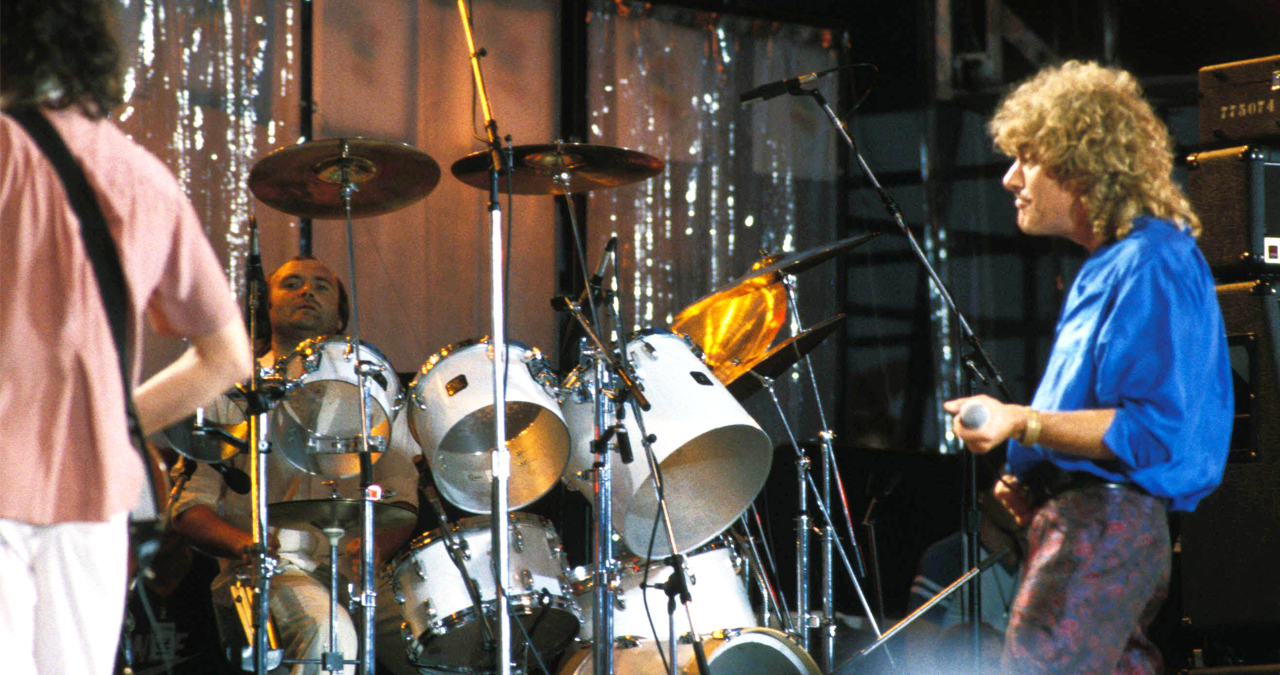
Phil did his best, but it just felt wrong.
"I know the wheels are falling off from early on in the set," said Phil in his book. “I can’t hear Robert clearly from where I’m sat, but I can hear enough to know that he’s not on top of his game. Ditto Jimmy."
Worried that things could collapse at any moment, Phil remained tightly locked onto Tony Thompson, hoping to keep firmly within a set tempo. Yet Thompson, contrary to Collins’ earlier advice, was bent on playing the most perplexingly heavy-handed approach to drums possible.
Collins found it hard to keep up. “If I could have left that stage, I would have left, half-way through Stairway, if not earlier.”
Phil later told The Telegraph newspaper, “If you watch the video, you can see Jimmy dribbling onstage, Robert not hitting the notes, and you can see me miming, playing the air, just to get out of the way.... When Zeppelin get together, something happens. Bad karma."
While Queen’s legendary Live Aid performance over at Wembley would go down as one of their - and music's - most iconic moments, the same can certainly not be said for the Led Zeppelin reunion, which many have done their best to scrub from the history books.
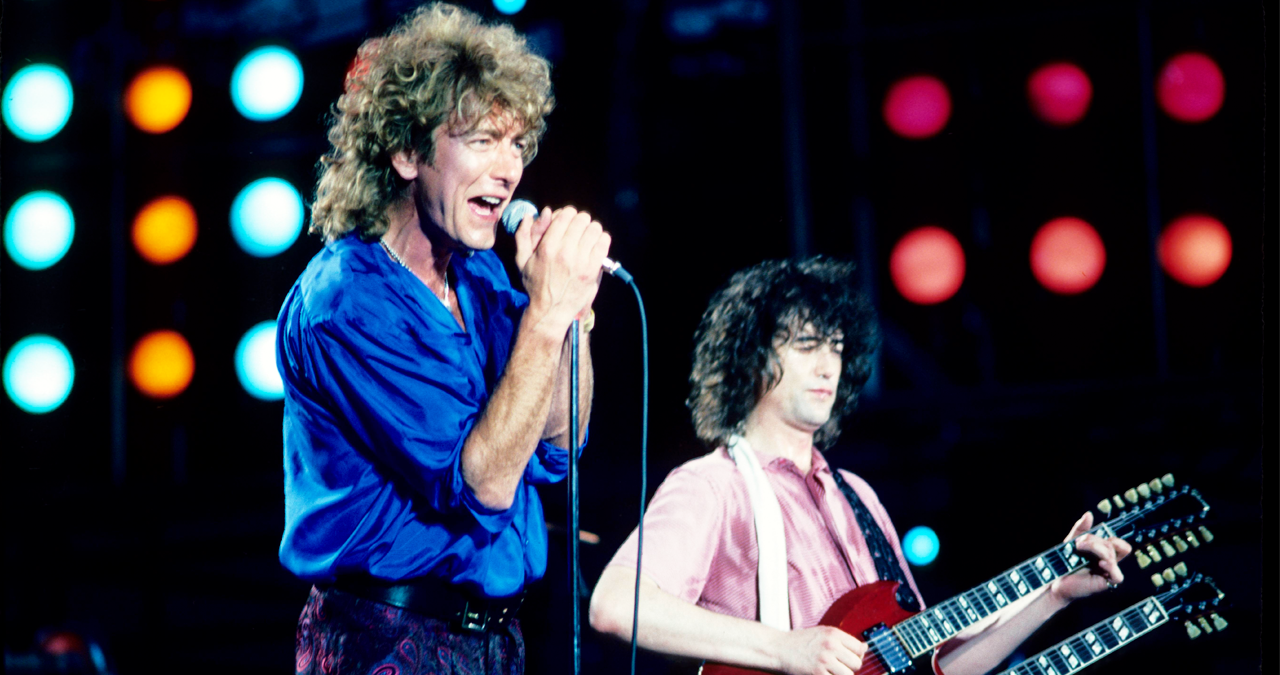
It was a disastrous performance which is remembered as one of the most, if not the most, embarrassing of Led Zeppelin’s history.
While some in the Led Zeppelin camp have clamoured to scapegoat Collins as the cause of the majority of the problems (and blocked footage of the gig from being commercially released), Phil still emerged from the day as one of Live Aid’s outright heroes.
Here was a man who’d thrown himself wholeheartedly at a wide range of music, travelled internationally, and set a new world record in aid of a cause bigger than himself. Characteristically, he ended this most eventful of days as down to Earth as ever.
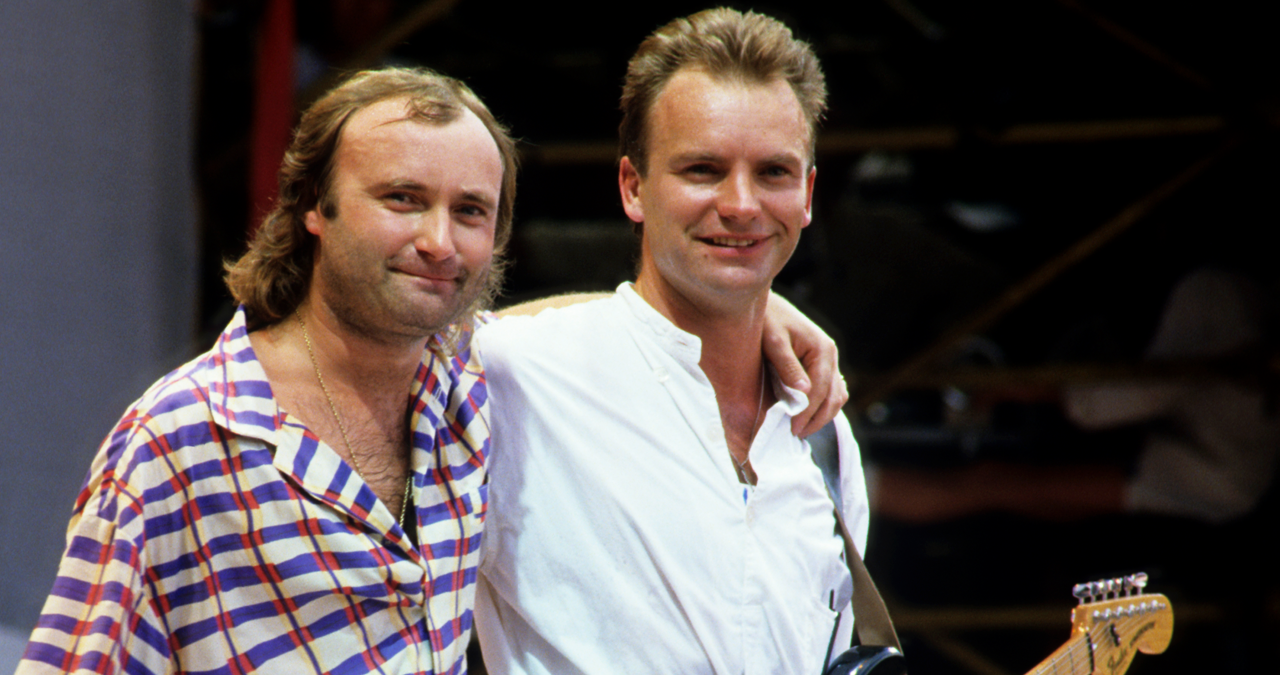
“It was like threading the two events together, which, in retrospect, I think it did,” Phil told David Sheff.
“At the end of it, I was back in New York and I was thinking, 'What's been going on today? I was in London this morning and performed with all those people and Eric just introduced me to Dylan and Keith Richards and Ronnie Wood and I performed in America, and then I played with Led Zeppelin doing Stairway to Heaven, and now I'm back in New York and tomorrow I go back home again.' It was extraordinary."

I'm Andy, the Music-Making Ed here at MusicRadar. My work explores both the inner-workings of how music is made, and frequently digs into the history and development of popular music.
Previously the editor of Computer Music, my career has included editing MusicTech magazine and website and writing about music-making and listening for titles such as NME, Classic Pop, Audio Media International, Guitar.com and Uncut.
When I'm not writing about music, I'm making it. I release tracks under the name ALP.
You must confirm your public display name before commenting
Please logout and then login again, you will then be prompted to enter your display name.
